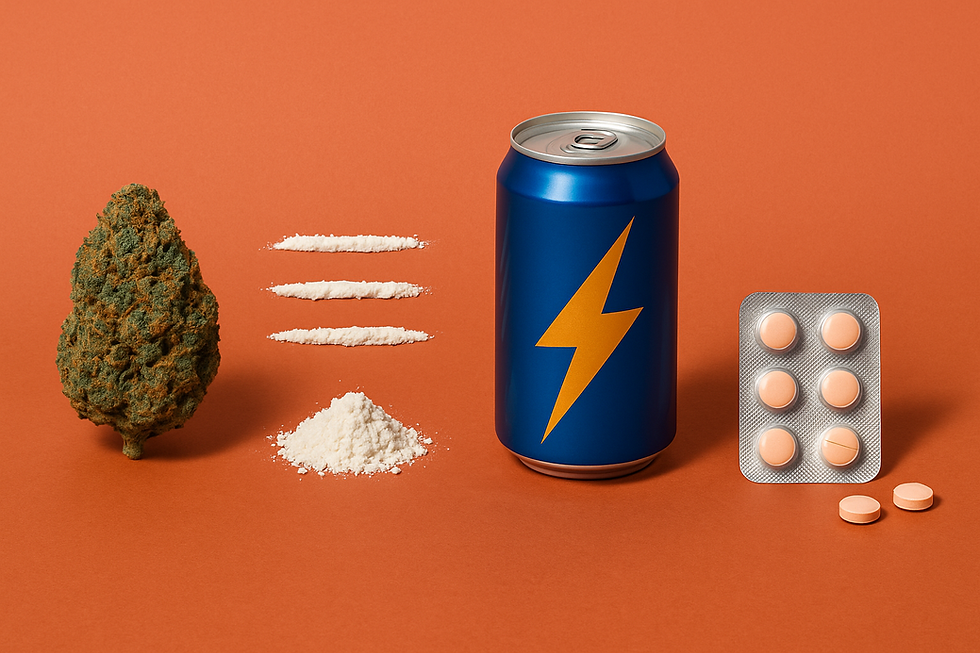What is THCV - About the SPEED WEED and Where to buy the elusive cannabinoid...
- Team Spyglass
- Jul 6, 2022
- 3 min read
THCV Tetrahydrocannabivarin
Introduction

If you've ever smoked marijuana, chances are you've experienced the euphoria that comes from tetrahydrocannabinol (THC). It's what gives pot its psychoactive effects and is one of the many cannabinoids found in the plant. But THC isn't the only cannabinoid with this effect—there are actually many other cannabinoids that interact with receptors in our body in interesting ways. One of them is tetrahydrocannabivarin (THCV), which produces effects similar to THC but may have some advantages over it as well. Read on to learn more about this fascinating chemical!
Tetrahydrocannabivarin (THCV) is a psychoactive chemical similar to tetrahydrocannabinol (THC) but with distinct differences.
Tetrahydrocannabivarin (THCV) is a psychoactive chemical similar to tetrahydrocannabinol (THC), with distinct differences. Both cannabinoids are found in cannabis plants, but THCV is a minor constituent of the plant, while THC is the most abundant active component. Both compounds were first isolated and identified in 1964 by Dr Roger Adams at Indiana University.[1][2] The name THCV is an abbreviation for "Tetrahydrocannabivarin".[3]
The two chemicals are both found in marijuana and hemp plants, where they help the plant to fight off insects by attracting natural predators.
The two chemicals are both found in marijuana and hemp plants, where they help the plant to fight off insects by attracting natural predators. THCV is a cannabinoid that works as an insecticide, but it also has psychoactive effects. Therefore, THCV is found only in cannabis strains that are bred specifically for high THC content (such as strains with “indica” genetics). THCV is a non-psychoactive chemical found only in hemp varieties of Cannabis sativa.
THCV has similar effects to THC. It can relieve pain and nausea, reduce anxiety, and may have appetite-suppressing effects.
THCV is similar to THC in that it can relieve pain, nausea and vomiting (e.g., from chemotherapy). It can also reduce anxiety and may have appetite-suppressing effects.
However, these effects vary because THCV doesn't bind strongly with the same cannabinoid receptors as THC.
However, these effects vary because THCV doesn't bind strongly with the same cannabinoid receptors as THC. It binds to receptors that have an inhibitory effect on the brain, which is why it produces less of a "high" than other cannabinoids. For example, it can lower blood pressure and decrease anxiety while still enhancing your memory and improving focus—which makes it popular among those who want to get rid of certain side effects of using weed.
In addition to these effects, THCV has been shown to help people lose weight faster than caffeine and nicotine combined! It does this by inhibiting an enzyme called fatty acid amide hydrolase (FAAH), which breaks down endocannabinoids like anandamide in your body so they don't activate any receptors except CB1 on neurons (which makes you feel stoned). The more FAAH you have in your system—and therefore less anandamide available for binding with CB1—the more likely you are going to see improvements in moods like depression or anxiety when using cannabis products with higher levels of THCV content such as the popular Spyglass THCV+ Maximum Strength.
THCV is similar to THC but with far different results
THCV is a psychoactive chemical, similar to THC but with distinct differences. It has similar effects to THC, but does not bind strongly with the same cannabinoid receptors as the latter. As such, it produces different effects than those of THC.
Conclusion
The fact that THCV has similar effects to THC but with far different results is very interesting. It’s also important because, unlike THC, it can be used as a medicine for people with diabetes or appetite loss due to cancer treatments. So if you’re looking for an alternative way of treating your condition, consider trying out some THCV!




Comments